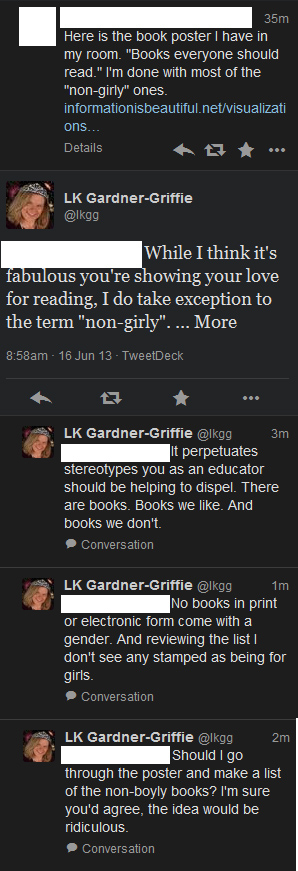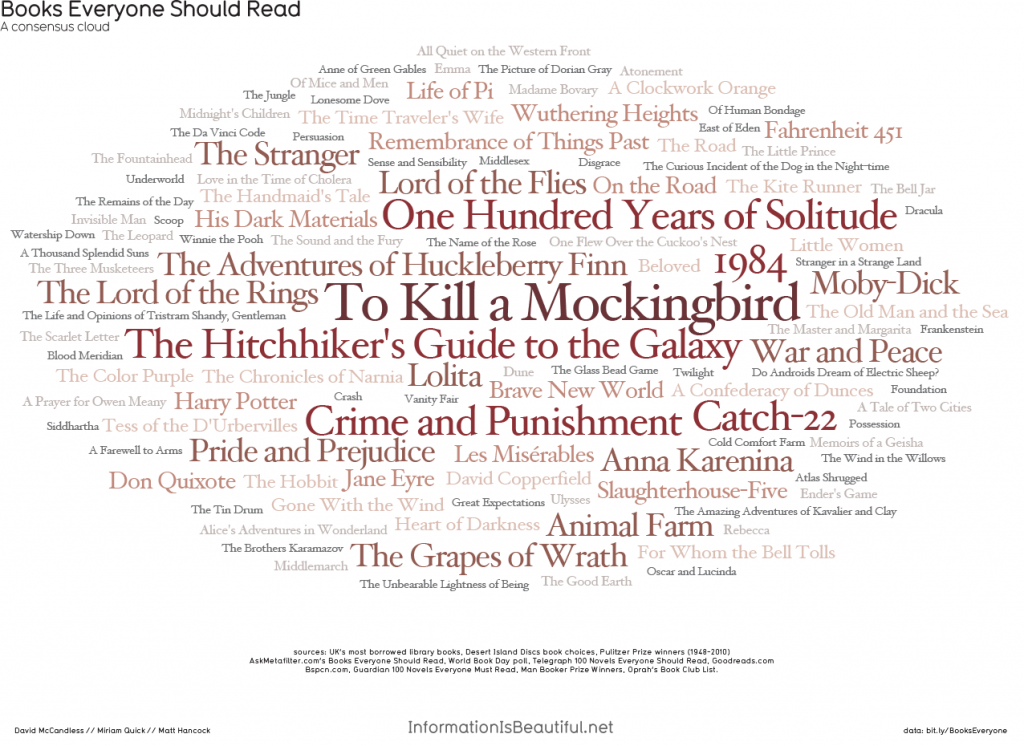
***ANNOUNCEMENT***
An interruption to #RevisionFest2013 has been called to bring you the following diatribe:
This morning I was flexing my fingers, getting ready to dive into the mountain of revisions awaiting me, when I saw a tweet float by in my stream. And I couldn’t let it go without comment. (And yes, the reason I was on Twitter was to state that #RevisionFest2013 had begun.) Normally, I watch tweets float by and can let them go, even when I feel the person is expressing a viewpoint different to mine. Because that’s what makes the world turn. Every person is entitled to their opinion and are free to express it. Just as I am free to disagree … which is what I did in this case, as you can see from the tweet conversation to the left.
The tweet that started this rant (in case you have difficulty reading in graphic form): Here is the book poster I have in my room. “Books everyone should read.” I’m done with most of the “non-girly” ones. I did try to let it go, but the more I thought about it, the more it bothered me. I’m not going to rehash my response on Twitter, but two things bothered me about the post. First — the obvious issue with “non-girly”. It is 2013 and we still haven’t gotten beyond denigrating things because they are associated with girls. Which is depressing for us as a society. When roughly half the population is disparaged for something out of everyone’s control, because not one of us chose to be born a girl or boy, and for those who might think I’m on a “man-hate” rant … I hear almost as much gender disparagement from women as I do from men. It’s what we’ve been taught. And it’s time to break through the barrier and realize regardless of whether born male or female, what matters is what we accomplish with our lives.
Am I saying there are no differences between men and women? Certainly not. There are differences. What I am saying is the differences don’t make one better than another. Why don’t we refer to things as boyly, since we have no problem classifying things as being girly? And back to the books, I have never seen a book with a gender. Ever. The purpose of a book is to be read. Period. They don’t come with a security system designed to only allow the “right type” to read them. No one has to go through a certification process aimed at determining whether the book is the “right” material for them. Whether they are worthy of reading it. Nor should there be a capricious determination based on genetic sex on whether the book should be read.
And how do we categorize books for targeting a specific sex anyway? Start with the protagonist? If male then it’s for boys … if female, it’s for girls? Where does that leave us with books like Animal Farm and Watership Down? Do we assign the pigs to the boys pile and the rabbits to the girls (because obviously bunnies are fluffier than pigs, so more girly, right?)? And what in the world do with do with Winnie the Pooh, that silly ol’ bear? Boys, because Pooh Bear belongs to a boy? Oh, but wait, stuffed animals are more a girls realm, aren’t they? (In case you missed it, sarcasm is dripping off those words.) Newsflash! — Books don’t care whether you are a boy, a girl, the abominable snowman, or an alien. Books are there to be read by anyone who finds them fascinating.
The second thing that bothered me about the post was the pride it showed in having read most of the books. Having read the majority of the books on the poster IS an accomplishment, and one any person should be proud to make. And yet, instead of making a simple statement of pride, it was tarnished by forcing stereotypes onto a list of great books. Which is sad.
Update: The educator did come back and state the quote was from a student. And left the question of Pride and Prejudice? I did respond it was not apparent in the initial post the quote was from a student. And I still take exception to the thought that books are gender specific. If we take a gender specific approach to reading, we’d all be much poorer for it. Books classified as being for boys or girls hurts society as a whole by not only perpetuating stereotypical roles, but cutting readers off from a wealth of experience.
Click the picture below to bring up the poster of titles.


10 Comments on “Book Genders”
This educator should have used the opportunity to educate rather than quoting a student (without any sign of attribution!) and making no comment. No comment = aggreement. I’m glad you didn’t let this one float by.
Thanks. And I agree. I’m not sure I wasn’t a little more appalled by the fact that the statement was posted anyway. Although I will note, it is difficult for the uninitiated to manage the 140 character limit. I did conduct due diligence by bringing up the stream, and didn’t find a peep about it being a student’s quote, nor about the opportunity for correcting such an assumption the statement afforded. And then to top things off by throwing out Pride and Prejudice? like surely I’d have to agree it is a “girl’s” book. …. Which I cannot do.
Also, given the list of books, this “student” is obviously an adult or at the very least a high school student who is astoundingly well-read and in an honors program. It’s sad that such a well-read, well-educated person holds this view without anyone challenging him or her. It’s also telling how few women authors are included in a list of “Books Everyone Should Read.” I imagine George Eliot and the Brontë sisters would be horrified to realize that a century and a half later, women are still writing under male pen names in order to be taken seriously and still having their work dismissed as “girly.”
The list was compiled based on the UK’s most borrowed library books, Desert Island Disc book choices, Pulitzer Prize winners (1948 – 2010), AskMetaFilters.com Books Everyone Should Read, World Book Day poll, Telegraph 100 Novels Everyone Should Read, Goodreads.com, Bspcn.com, Guardian 100 Novels Everyone Must Read, Man Booker Prize Winners, Oprah’s Book Club list. They must have entered all the titles and with some weighting and ran it through Wordle to get the poster. And yes, the lack of female author representation in the list is troublesome.
My expectation is that since the post was tweeted by a high school teacher, the student in question is in high school, but your point of being an extremely well-read, honors program level student are well taken. And it is exceptionally sad we are sending students into the world holding these views.
Well, I’m embarrassed to say I’ve only read about a quarter of those books myself, and I have a degree in English. Very few of those I read in high school (a few earlier, obviously, like The Chronicles of Narnia, which incidentally, isn’t “a book” LOL). And as I looked through it I had a good giggle about Twilight being listed in there. Unless it’s not the Twilight I’m thinking of. 😉
I had noted Twilight as well, but believe it is on the list from the Most Borrowed books source as well as Goodreads. 😀 And I have to say I haven’t read even close to all of the books on the list. Those I have, some were prior to high school, a few in high school, but several afterward.
One of my favorites from high school is Catch-22… should I have chosen not to read it because it had a male protagonist and was about the very “ungirly” topic of war?
LK,
Then there’s the gender and what? sexual mix? To Kill a Mockingbird is girlie because Scout and her author Harper are female? But both Scout and Harper are tomboys, so where does that take us? I only have questions, but we need to have our noses rubbed into the labels we use. Thanks!
To Kill a Mockingbird is one of my favorite books of all time. Along with Little Women, Tom Sawyer, and a host of others (and yes, I have difficulty with the concept of picking a single favorite). And yes, I deliberately threw in a book written by Mark Twain, along with the books written by women. Because I cannot imagine my life without the works of Mark Twain, anymore than I can imagine it without the works of Louisa May Alcott. Reading across genres, reading books written by both men and women, reading books with protagonists who are male and female, as well as from cultures different than my own, causes me to be a more well-rounded individual.
Are we saying it is only necessary for girls to be well-rounded in their literary tastes, and not boys? (See… I have questions, too. 🙂 )
Also consider that many good books by female authors are written from the male POV, and vice versa. How should they be categorized? Is a book in which the narrating character is male and the author is female a “girly” or “boy’s” book? Is a book authored by a man, where he speaks through the lips of a woman, intended for a male or female audience? Books are for anyone who enjoys them, gender is irrelevant.
Hear, hear.Trying to classify the books as being for girls or boys is too difficult, because there are too many variables involved for clear cut judgment. Which brings up the question of how others seem to classify them as for one or the other in the first place.